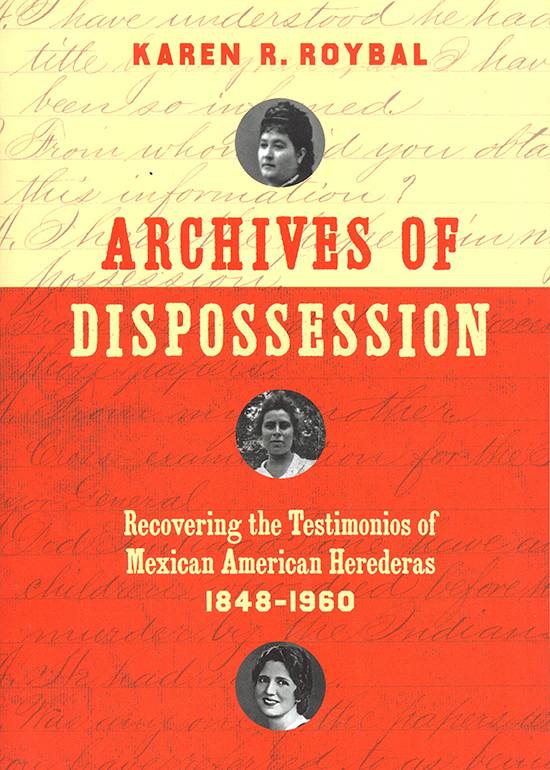Hear Me Roar

Archives of Dispossession: Recovering the Testimonios of Mexican American Herederas, 1848-1960
by Karen R. Roybal
Chapel Hill: The University of North Carolina Press, 2017.
169 pp. $27.95 paper.
Reviewed by
Charles McGregor
Karen R. Roybal’s Archives of Dispossession: Recovering the Testimonios of Mexican American Herederas 1848-1960 is a perfect counter-narrative to the male-centric lens of history with the misconception that women played no role in the making of this world. Archives of Dispossession examines the aftermath of the infamous provisions added to the 1848 Treaty of Guadalupe Hidalgo resulting in 90% of homes being lost by landowning Spanish-Mexican residents due to Anglo squatters, intermarriage, or land adjudication proceedings initiated by the United States. While a lot has been written about this subject in various borderlands historical texts, Roybal points out that sporadic accounts have considered the female perspective even though Mexican and Spanish law allowed Spanish-Mexican female residents to freely buy and sell land (in contrast to U.S. law at the time). Archives of Dispossession presents female borderland voices through court testimonios, memoirs, novels, and other non-traditional historical texts showing their quintessential role in matters of land ownership and culture. This revisionist attempt of borderland history is a critical lens to look through as it shows us that, despite the oppressive patriarchal structures Mexican American women had to endure, they were still crucial historical actors worthy of study.
María Amparo Ruiz de Burton is one of these actors that shatters the trope of the docile woman resigned to the ill effects of an oppressive patriarchal system. In the Ruiz de Burton chapter, Roybal profiles a person who endures the travesties of land dispossession. Roybal notes that Ruiz de Burton's novels "points to the constraints of what it means to be female and Mexican American in the nineteenth century while simultaneously including depictions of women as powerful actors despite the odds stacked against them." Ruiz de Burton's power is demonstrated through her challenge to historian Hubert Howe Bancroft who, in his History of California (1884-90) project, declared the testimonios of Mexican American women involved in legal land disputes as “dead papers” and took only the accounts of Mexican American landowning men seriously. Roybal argues that Ruiz de Burton challenged Bancroft’s downplaying of California landowners using her novels to fill the historical absence of the “dead papers” that are excluded from Barton’s and other histories:
I therefore examine her literary production as part of a historical alternative archive in which Ruiz de Barton strategically uses fiction as a form of testimony in which she addresses the concept of dispossession that she inherited as a Mexican American woman and landowner during the crucial period of U.S. empire building.
This radical approach of using unconventional historical texts (such as novels) has the potential to fill in the gaps of the essential role females have played in history that previous historical texts, such as Bancroft’s, attempted to suppress.
While the Ruiz de Burton chapter focuses on property dispossession, Roybal also makes compelling arguments about cultural dispossession throughout her archival work. Jovita González is one of the authors Roybal uses to understand the extent of cultural dispossession. Much like land, intellectual property is a lucrative commodity that patriarchal systems have used as a tool of repression against women and disenfranchised minorities. Like Bancroft's tactic of declaring Mexican American women's testimonios as "dead papers," González’s creative works, according to Roybal, have been minimized in comparison to her work as a folklorist even though her creative works highlight historical examples of cultural dispossession worthy of study. By using the entirety of González’s collective works as a historical framework, Roybal provides what she calls “a critical lens on the categories of gender, cultural memory, and dispossession in works placed at the intersections of literary history and archival research.”
Despite the circumstances that Mexican American women had to endure in the aftermath of the Treaty of Guadalupe Hidalgo, they still find ways to be crucial actors in the shaping of history, culture, and scholarship. The profiling of the females within this archive shows that there is a bountiful collection of female historical and literary experiences worth studying. Roybal’s approach for how we discover these voices is a crucial blueprint to use when unearthing these voices and reconstructing our historical understanding of Mexican American women and, potentially, other underrepresented populations.
Charles McGregor teaches composition, rhetoric, and creative writing at the University of Texas Rio Grande Valley (UTRGV). He is also the Nonfiction Editor for the literary journal riverSedge, which is run by the MFA department at UTRGV. When not daydreaming of ideas for how to make an awesome classroom experience for his students, he likes to compose creative works tackling difficult queer issues in the Southern United States. Some of his works can be found in modest literary magazines such as Crab Fat Magazine, Boundless, Portland Review, and Five:2One Magazine. You can find links/info to some of his published works at www.charlesmcgregorsduendecorner.tumblr.com.
